Search Results
Fine Jewelry University Articles matching: “Floating diamond necklace”
Showing only FJU Article results. Click here to show all results.
Fine Jewelry University (Show All FJU Articles)
-
Frequently Asked Question about Jewelry
… industry is staggering. What is Moissanite? Moissanite is lab-created silicon carbide. It has become an excellent diamond imitation since it gives a positive reading on a thermal inertia testers (diamond testers). Some people use this … diamond buyer out of their money. What is the difference between a Diamond Certificate and an Appraisal? A Diamond Certificate is a document issued by a Gemological Laboratory describing a Loose Diamond. The laboratory will not issue …
-
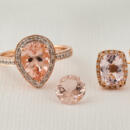
Gem in the Spotlight: Morganite
… gemstone for jewelry. Its wide range of soft pinkish colors makes it highly desirable as it compliments most skin tones and complexions. It is entirely appropriate for everyday wear, and it can be worn as rings, pendants, earrings, necklaces, bracelets, pins, brooches, or whatever else you can think of. Morganite is considered very affordable, especially allowing for its rarity. But, it may be hard to find in local jewelry stores as it is still relatively less popular than…
-
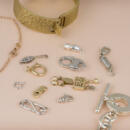
Types of Jewelry Clasps
… for you. History of Jewelry Clasps Jewelry clasps are a small but important component of many types of jewelry like necklaces, bracelets, and anklets. Clasps allow for easy attachment and removal of the jewelry and provide a secure way to … known clasp style. This type of clasp was often made from softer metals like gold or copper and used to fasten necklaces and bracelets. The hook-and-eye clasp was also used by the Greeks and Romans who often embellished them with gemstones …
-
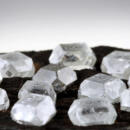
Is a Lab Grown Diamond Right for Me?
Picking a diamond for your engagement ring is a big decision. For most of us, buying a diamond is a significant financial undertaking… don’t have (anyone remember their refractive indexes from high school physics?). Even more unfortunately, the diamond industry suffers from a lot of misinformation and paranoia both from inside the trade and from outside observers. I have … conflict diamonds (both wild falsehoods). On the other hand, I have heard some in the industry refer to lab grown diamonds as fakes (also completely false). We’re here to help cut through some of the rhetoric, so you can make an informed …
-
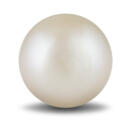
Gem in the Spotlight: Pearl
… famous figures, including Napoleon III and Elizabeth Taylor. During Taylor’s ownership, the pearl was set into a necklace designed by Cartier, which also included diamonds and rubies. The La Peregrina pearl is one of the largest and most …! Keep in mind though that pearl rings in particular are not intended for everyday wear. Rings take more abuse than necklaces or earrings, so wear your pearls rings for special occasions to help them last. Restring Often: Even following all …
-
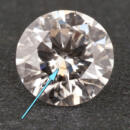
What Are Lab Grown Diamonds?
In the simplest terms, lab grown diamonds are diamonds that have been made by people instead of mined out of the earth. If it’s so simple, you might wonder …this sentence. The complexity arises from the fact that lots of different terms have been used to describe lab grown diamonds and their cousins, and not everyone uses these terms in the same way. So, let’s begin with some vocabulary. … mean man-made, copied, unreal, or even imitation. But, in this context, what do we mean when we say “synthetic diamond”? In the gemological world, synthetic is a highly technical term. When speaking technically, synthetic gems are man-made …
-

How Are Lab Grown Diamonds Made?
The dream of making a beautiful and valuable diamond from simple carbon has long captivated the imagination of scientists and visionaries alike. Just like the alchemists…, many have tried to achieve this impressive feat. We have only recently been able to produce gem quality, lab grown diamonds that are large enough to be used in jewelry. But, how is it done? Early Efforts Throughout history, many people …. Henri Moissan was one of the early pioneers in the field. In 1893, he claimed to have successfully made a diamond by heating charcoal to 3,500 degrees Celsius inside a carbon crucible. Many attempts were made to reproduce his techniques …
-
Caring for and Cleaning Your Jewelry
How to Clean Jewelry A diamond‘s spectacular beauty is due to its light show. Diamonds make light reflect, show its many colors, and dazzle. To … and lotions add a coating that stops the light show. Dust and dirt stick to the grease and oils creating a lifeless diamond. Cleaning your diamond jewelry at home is simple and rewarding. Use a soft toothbrush and mild soap then rinse … key to diamond cleaning is the underneath side or pavilion. The light needs a clean surface to bounce upward. The diamond may need to be scrubbed several times before all the build up is removed. Some don’ts of jewelry cleaning. Never use …
-
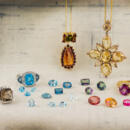
Gem in the Spotlight: Topaz
…ht. History and Lore Topaz in its pure form is naturally colorless, clear like a diamond. The famous “Braganza Diamond” was thought to be the largest diamond ever found (prior to the Cullinan Diamond) at 1,680 carats and was set in the Portu… to put coatings on lenses for glasses and cameras. It is also one of the processes that is used to create lab grown diamonds . A thin, multi-colored film is bonded on the surface of colorless topaz to create all the colors you see in Mystic…